Module 12 Help Unit 3 Language in use . 课件(共31张PPT)
文档属性
| 名称 | Module 12 Help Unit 3 Language in use . 课件(共31张PPT) |  | |
| 格式 | zip | ||
| 文件大小 | 2.6MB | ||
| 资源类型 | 教案 | ||
| 版本资源 | 外研版 | ||
| 科目 | 英语 | ||
| 更新时间 | 2018-12-14 17:45:57 | ||
图片预览

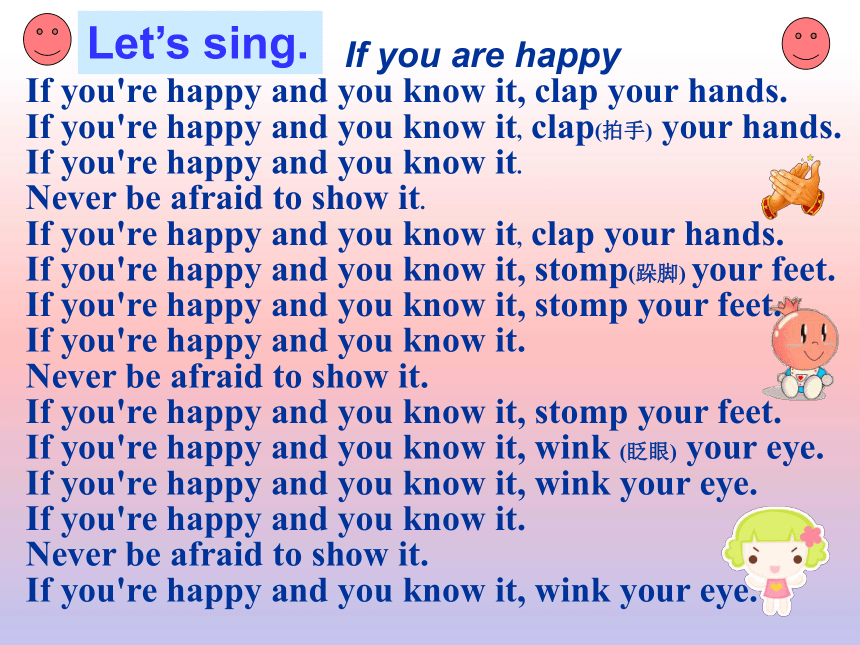

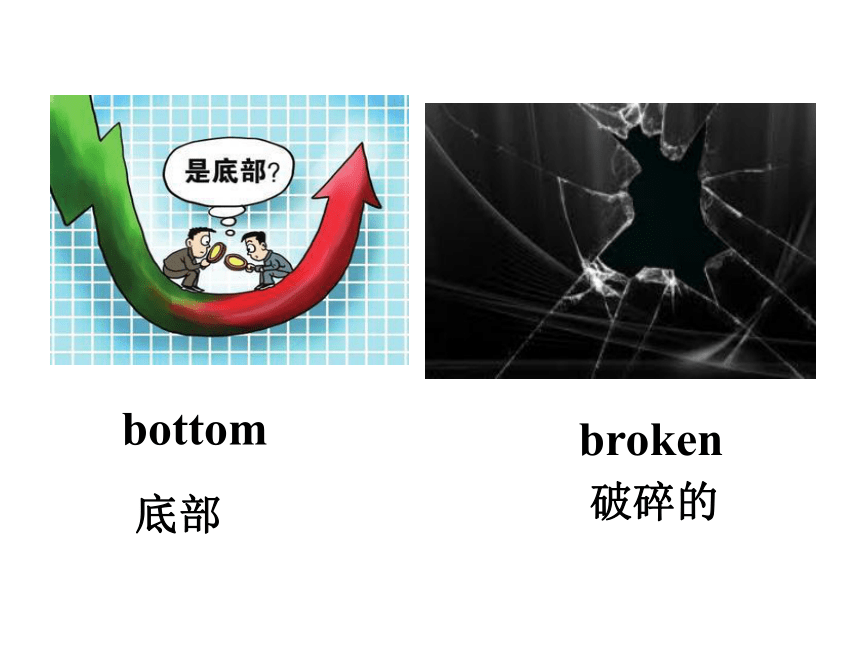
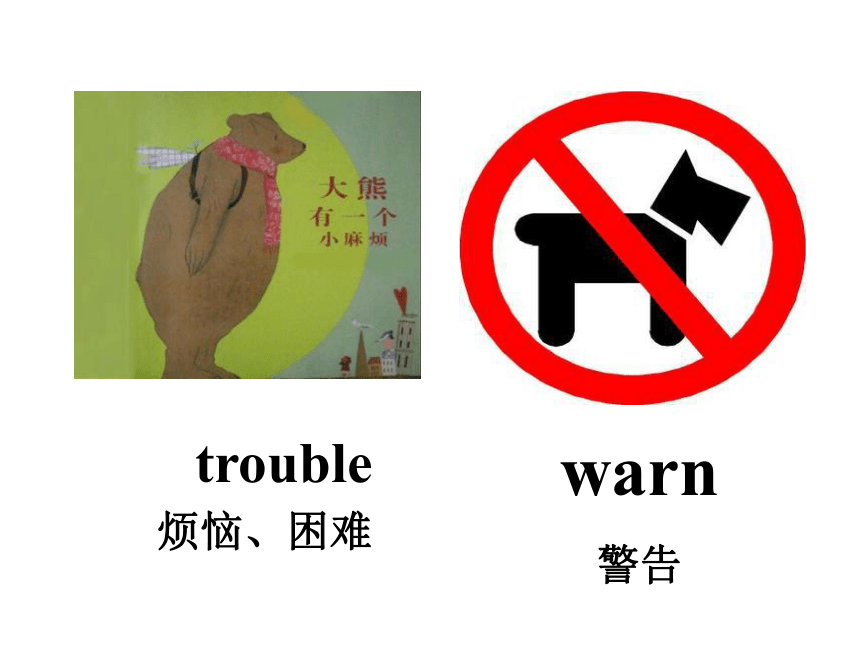
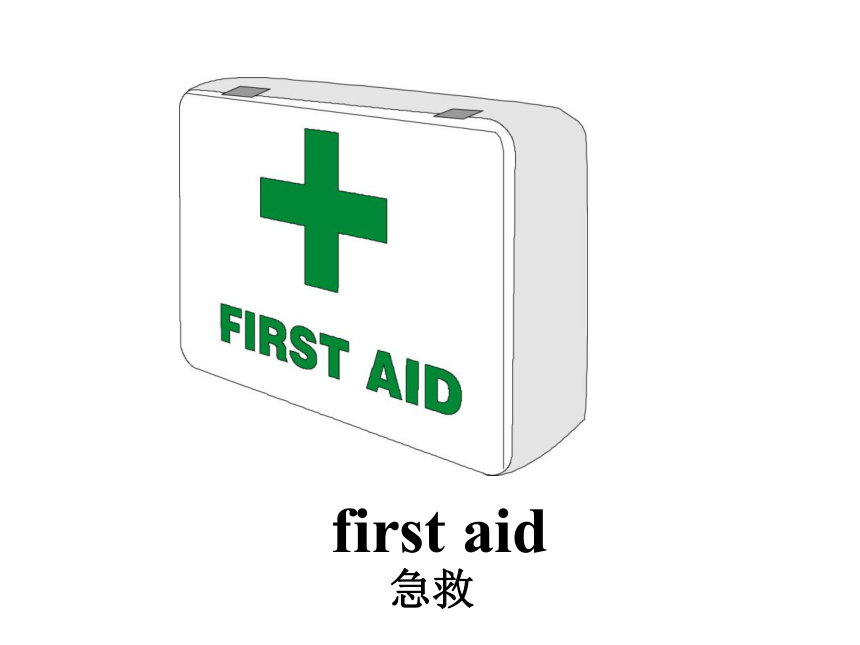



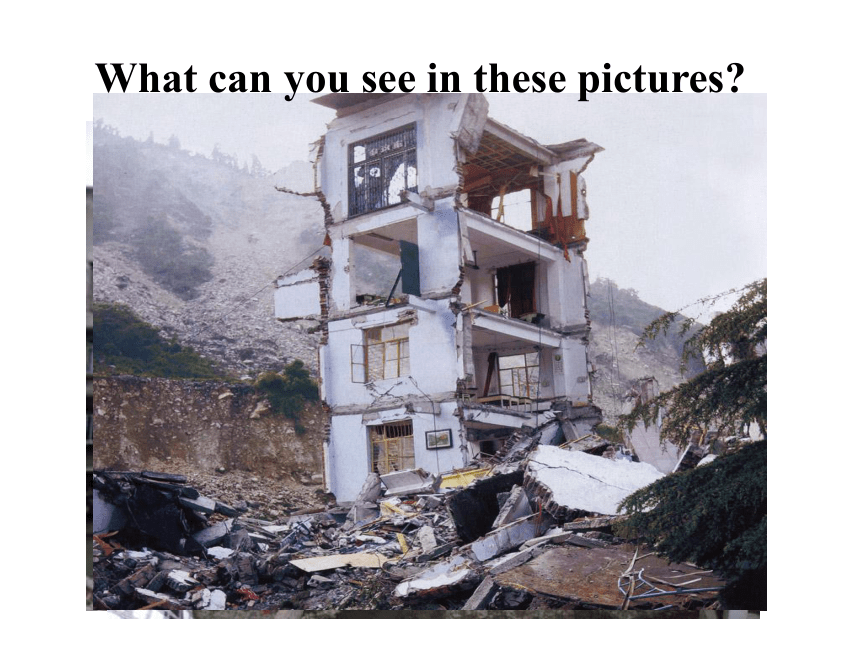

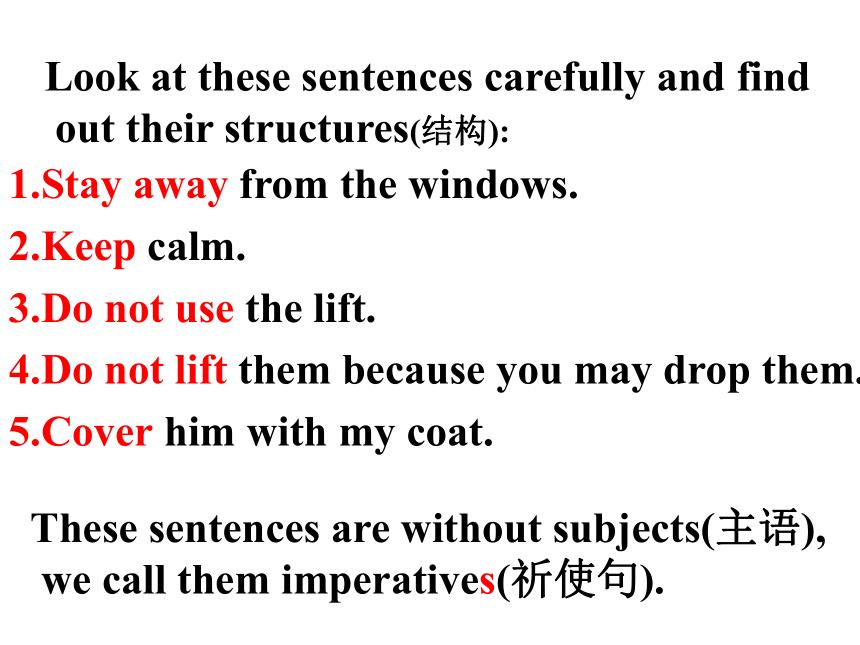
文档简介
课件31张PPT。Unit 3
Language in useModule 12 Help If you are happy If you're happy and you know it, clap your hands. If you're happy and you know it, clap(拍手) your hands.
If you're happy and you know it. Never be afraid to show it. If you're happy and you know it, clap your hands. If you're happy and you know it, stomp(跺脚) your feet. If you're happy and you know it, stomp your feet. If you're happy and you know it.
Never be afraid to show it. If you're happy and you know it, stomp your feet. If you're happy and you know it, wink (眨眼) your eye. If you're happy and you know it, wink your eye. If you're happy and you know it. Never be afraid to show it. If you're happy and you know it, wink your eye.Let’s sing.earthquakeWords revisionLead-in地震医疗的medical bottom底部broken破碎的trouble烦恼、困难warn警告first aid急救calm镇静的power电、电力lift举起,抬起harmful有害的drop使落下Who can remember
the most!Play a Game!What can you see in these pictures?1. Get / Do not get medical help immediately.
2. Ask / Do not ask them where the pain is.
3. Lift / Do not lift them because you may drop them.
4. Keep / Do not keep them warm. Choose the correct first aid instructions.Look at these sentences carefully and find
out their structures(结构):Stay away from the windows.
Keep calm.
Do not use the lift.
Do not lift them because you may drop them.
Cover him with my coat.
These sentences are without subjects(主语),
we call them imperatives(祈使句).It is a fine day today. Let’s go out for a walk.Let’s do sth.What’s more, Just a minute, please!
This way, please!Let’s take a taxi, shall we?Game time!Mr Bian says…Can you rewrite(改写) these sentences
with must or mustn’t? Get medical help immediately.
Ask them where the pain is.
Do not lift them because you may drop them.
Keep them warm.
You must get medical help immediately.You must ask them where the pain is.tYou mustn’t lift them because you may
drop them.You must keep them warm.When the earthquake comes, it is dangerous.
You ______ keep out, or you will be in trouble must处于困境中stairsThese stairs are not safe, you _______
use them.mustn’tThe rocks are falling down.
You ______ get hit. couldThe river is too deep.
You ______ swim in it. mustn’tBetty ______ know what to do because she did some medical training. must医疗培训So, can you draw a conclusion(得出结论)
about how to use the modal verbs (情态动词),
such as must, mustn’t, can or could? mustIf something you should do, If something you are not allowed(允许) to do,mustn’tSo, We can also use must, can, could for
prediction(预测,推测)Enjoy some picturesYou mustn’t turn right.You must stop!Enjoy some picturesYou mustn’t smoke.You must walk by the
right side.Enjoy some picturesThe book must be Tony’s, because there is his name on it.This English book
must be Li Daming’s.
It can’t be Tony’s. Enjoy some picturesLet's read together! A ten-year-old girl saved about one hundred tourists in 2004 by warning them that a tsunami, a huge ocean wave, was on its way across the sea. She knew what was happening because she learnt about underwater earthquakes at school only a few weeks earlier, a newspaper reported.
I was on the beach and the water started to go funny,” Tilly Smith told the reporter from the newspaper. “There were bubbles and the water went back suddenly. I knew there was going to be a tsunami. I told mum,” she said.Let's read together! Tilly’s mother and the hotel workers acted quickly. They cleared people from the beach just minutes before a huge wave reached the land. Luckily, no one die.
Tilly’s teacher was very proud of her. “She’s a very clever girl... It is very lucky that our class were learning about this kind of tsunami just two weeks before Christmas,” he told the newspaper.1. What’s the best title for this passage?
2004 Asian tsunami.
A girl saves tourists from tsunami.
c) Underwater earthquakes.
2. What did Tilly notice?
a) Water coming to the beach.
b) People watching the water.
c) Bubbles in the water.√Read the passage and choose the correct answer.√3. What does her teacher think of Tilly?
a) She’s lucky.
b) She doesn’t do silly things.
c) She’s a clever student.√Trouble is not terrible. If we are united(团结)
and give our helping hands, we can solve
everything easily.How to use the imperative (祈使句), do sth. or don’t do sth.
How to use the modal verbs(情态动词), such as must, mustn’t can, could.SummaryHomeworkReview the usage of imperative and modal verbs. Try to make some sentences.
Finish the exercises in Act.4 & Act. 5 on
Page 101.
3. Make a poster about The First Aid.
Language in useModule 12 Help If you are happy If you're happy and you know it, clap your hands. If you're happy and you know it, clap(拍手) your hands.
If you're happy and you know it. Never be afraid to show it. If you're happy and you know it, clap your hands. If you're happy and you know it, stomp(跺脚) your feet. If you're happy and you know it, stomp your feet. If you're happy and you know it.
Never be afraid to show it. If you're happy and you know it, stomp your feet. If you're happy and you know it, wink (眨眼) your eye. If you're happy and you know it, wink your eye. If you're happy and you know it. Never be afraid to show it. If you're happy and you know it, wink your eye.Let’s sing.earthquakeWords revisionLead-in地震医疗的medical bottom底部broken破碎的trouble烦恼、困难warn警告first aid急救calm镇静的power电、电力lift举起,抬起harmful有害的drop使落下Who can remember
the most!Play a Game!What can you see in these pictures?1. Get / Do not get medical help immediately.
2. Ask / Do not ask them where the pain is.
3. Lift / Do not lift them because you may drop them.
4. Keep / Do not keep them warm. Choose the correct first aid instructions.Look at these sentences carefully and find
out their structures(结构):Stay away from the windows.
Keep calm.
Do not use the lift.
Do not lift them because you may drop them.
Cover him with my coat.
These sentences are without subjects(主语),
we call them imperatives(祈使句).It is a fine day today. Let’s go out for a walk.Let’s do sth.What’s more, Just a minute, please!
This way, please!Let’s take a taxi, shall we?Game time!Mr Bian says…Can you rewrite(改写) these sentences
with must or mustn’t? Get medical help immediately.
Ask them where the pain is.
Do not lift them because you may drop them.
Keep them warm.
You must get medical help immediately.You must ask them where the pain is.tYou mustn’t lift them because you may
drop them.You must keep them warm.When the earthquake comes, it is dangerous.
You ______ keep out, or you will be in trouble must处于困境中stairsThese stairs are not safe, you _______
use them.mustn’tThe rocks are falling down.
You ______ get hit. couldThe river is too deep.
You ______ swim in it. mustn’tBetty ______ know what to do because she did some medical training. must医疗培训So, can you draw a conclusion(得出结论)
about how to use the modal verbs (情态动词),
such as must, mustn’t, can or could? mustIf something you should do, If something you are not allowed(允许) to do,mustn’tSo, We can also use must, can, could for
prediction(预测,推测)Enjoy some picturesYou mustn’t turn right.You must stop!Enjoy some picturesYou mustn’t smoke.You must walk by the
right side.Enjoy some picturesThe book must be Tony’s, because there is his name on it.This English book
must be Li Daming’s.
It can’t be Tony’s. Enjoy some picturesLet's read together! A ten-year-old girl saved about one hundred tourists in 2004 by warning them that a tsunami, a huge ocean wave, was on its way across the sea. She knew what was happening because she learnt about underwater earthquakes at school only a few weeks earlier, a newspaper reported.
I was on the beach and the water started to go funny,” Tilly Smith told the reporter from the newspaper. “There were bubbles and the water went back suddenly. I knew there was going to be a tsunami. I told mum,” she said.Let's read together! Tilly’s mother and the hotel workers acted quickly. They cleared people from the beach just minutes before a huge wave reached the land. Luckily, no one die.
Tilly’s teacher was very proud of her. “She’s a very clever girl... It is very lucky that our class were learning about this kind of tsunami just two weeks before Christmas,” he told the newspaper.1. What’s the best title for this passage?
2004 Asian tsunami.
A girl saves tourists from tsunami.
c) Underwater earthquakes.
2. What did Tilly notice?
a) Water coming to the beach.
b) People watching the water.
c) Bubbles in the water.√Read the passage and choose the correct answer.√3. What does her teacher think of Tilly?
a) She’s lucky.
b) She doesn’t do silly things.
c) She’s a clever student.√Trouble is not terrible. If we are united(团结)
and give our helping hands, we can solve
everything easily.How to use the imperative (祈使句), do sth. or don’t do sth.
How to use the modal verbs(情态动词), such as must, mustn’t can, could.SummaryHomeworkReview the usage of imperative and modal verbs. Try to make some sentences.
Finish the exercises in Act.4 & Act. 5 on
Page 101.
3. Make a poster about The First Aid.
同课章节目录
- Module 1 How to learn English
- Unit 1 Let's try to speak English as much as possi
- Unit 2 You should smile at her.
- Unit 3 Language in use .
- Module 2 My home town and my country
- Unit 1 It's taller than many other buildings.
- Unit 2 Cambridge is a beautiful city in the east o
- Unit 3 Language in use .
- Module 3 Sports.
- Unit 1 Nothing is more exciting than playing tenni
- Unit 2 This year we training more carefully.
- Unit 3 Language in use .
- Module 4 Planes, ships and trains .
- Unit 1 He lives the farthest from school.
- Unit 2 What is the best way to travel.
- Unit 3 Language in use .
- Module 5 Lao She Teahouse.
- Unit 1 I wanted to see the Beijing Opera.
- Unit 2 It descibes the changes in Chinese society.
- Unit 3 Language in use .
- Module 6 Animals in danger.
- Unit 1 It allows people to get closer to them .
- Unit 2 The WWF is working hard to save them all.
- Unit 3 Language in use .
- Revision module A
- Module 7 A famous story
- Unit 1 Alice was sitting with her sister by the ri
- Unit 2 She was thinking about her cat.
- Unit 3 Language in use .
- Module 8 Accidents
- Unit 1 While the car were changing to red, a car s
- Unit 2 I was trying to pick it up when it bite me
- Unit 3 Language in use .
- Module 9 Population
- Unit 1 The population of China is about 1.37 billi
- Unit 2 Arnwick was a city with 200,000 people.
- Unit 3 Language in use .
- Module 10 The weathe
- Unit 1 It might snow.
- Unit 2 The weather is fine all year round.
- Unit 3 Language in use .
- Module 11 Way of life
- Unit 1 In China ,we open a gift later.
- Unit 2 In England, you usually drink tea with milk
- Unit 3 Language in use .
- Module 12 Help
- Unit 1 What should we do before help arrives?
- Unit 2 Stay away from windows and heavy furniture.
- Unit 3 Language in use .
- Revision module B
